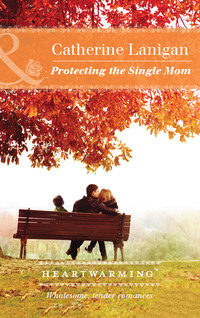
Полная версия
Love Shadows
Sarah went to her frosted, double-hung window and lifted the sash. A warm, fresh breeze with a hint of lilacs drifted past the sill. She inhaled deeply and sighed.
Just then, her phone rang. She looked at the blinking light. It was Lou Ann at the front desk.
“This is Sarah.”
“Charmaine wants to see you in the conference room. Do you want some coffee?” Lou Ann asked sweetly, with a hint of the Southern accent she’d brought with her when she and her husband moved here from Tennessee.
“Sounds lovely,” Sarah replied. “I’ll be there.”
Sarah hung up, looked down at her portfolio and crossed her fingers for luck. Mom, I know you’re up there pulling for me. You, too, Daddy. If this goes right today, I could finally get a promotion.
She looked around her office and grimaced. Okay. That’s not likely. But, she thought, sticking her finger in the air with a bit of anticipation, landing the client myself would be a huge feather in my cap.
With one last glance heavenward, Sarah picked up her portfolio and left her office.
* * *
CHARMAINE CHALMERS WORE a spring-green, silk sweater set with light beige crepe slacks and low-heeled, leopard-print designer pumps. Today, her jewelry was simple, for Charmaine— a pure gold, diamond-studded chain around her neck and chocolate diamond hoop earrings. She wore no wedding rings, having never been married, and had a man’s alligator-banded antique Hamilton watch on her wrist.
No one knew where the watch came from, but Sarah guessed it had belonged to Charmaine’s wealthy Miracle Mile entrepreneur father who disinherited his daughter over thirty years ago when she moved to Indian Lake to strike out on her own.
Sarah’s eyes squinted together as she watched her boss peer over her drawings for far too long before sharing her assessment.
Charmaine was the kind of person who, if she liked something, would be instantaneously effusive.
There was nothing coming out of Charmaine’s mouth this morning that remotely resembled pleasure—or even mild acceptance.
“You don’t like it,” Sarah said. If she stated the obvious, maybe the rejection wouldn’t cut so deeply.
She was wrong.
“I don’t,” Charmaine said too bluntly and too quickly. “The reception area is the focal point of all our commercial designs. This is the first impression customers or patients receive. Look here. The counter is much too angular. We have always prided ourselves on our Feng Shui design, and I see none of that here. The client expressly requested that this back wall be a lighted glass block, not this bank of file cabinets and shelves. Also, your color boards don’t have the spark I’ve come to expect from you. Where’s your inventiveness?”
Sarah looked at her color boards with their earth tones of tan, brown, camel and brick. Charmaine picked up a swatch of Aztec sun-gold brocade with turquoise and jet beads and tossed it over the color board. The other colors instantly came to life and radiated energy.
Sarah smiled. Then sighed. “I see what you mean.”
Charmaine’s expertly made-up eyes glistened with a sheen that Sarah suddenly realized were tears. “I don’t know how to say this, Sarah.”
Sarah thought she’d quick-frozen her emotions when her mother died two months ago. She was wrong.
Loss and grief had no boundaries.
They just kept rolling on with a vengeance, unmindful of the human hearts in their path.
“Say...what?”
Charmaine exhaled a long, yogalike breath. She folded her hands in front of her, on top of Sarah’s drawings. “I want you to know that I hold you and your talent in deep regard. I couldn’t love you more if you were my own daughter. Nevertheless, we have to face something here, Sarah...”
“Which is?” Sarah could barely swallow. She looked down at her drawings and for the first time saw them for what they were. Mediocre. She cringed. She felt as small as the tiniest spec in the universe.
“These past months have been difficult for you. No, its more than that. They have been hell. First your father died two years ago, then your mother got sick. You’ve been her support all this time. I don’t know how you’ve managed to do it, quite frankly.”
Sarah couldn’t take her eyes off her drawings. “Apparently, I haven’t done it.”
Charmaine reached out and touched Sarah’s hand. “Yes. You have. You do so much. But this—” she swept her hand over the papers “—this just isn’t your best work.”
“It isn’t,” Sarah said flatly. She supposed despair would set in later, but for now, she looked up at Charmaine. “You’re absolutely right. It’s not coming together for me.”
Charmaine moved a bit closer to Sarah. “I want you to listen to me. Don’t say anything until I’m finished.”
“Okay,” Sarah replied, her mouth going dry.
“I want you to take a leave of absence. Take a couple of months off.”
“What? Now? I can’t leave now.” A burning sob grabbed Sarah by the throat. Without her work, she would be nothing. Without a project to wrestle with the grief she felt every waking minute of the day, she knew beyond a doubt she would go insane. She was at Charmaine’s mercy more than she’d realized. She couldn’t imagine not coming to this office every morning and seeing the rest of the staff. The idea was ludicrous. She wanted this job. She needed her work. “You don’t understand, Charmaine.”
“Yes, I do,” Charmaine said softly. “I’m not firing you. On the contrary. I think you have more talent than anyone I’ve ever met. Given a bit more flair, you could be me.” Charmaine tried to laugh, but Sarah’s face was stone.
“Okay,” Charmaine continued. “Let me tell you a story. A long time ago, I was lost. Truly lost. I had no one. My family had turned their backs on me. I’d lost the one person I thought I loved, but he didn’t love me back. I lost my job in Chicago and I thought the world had come to an end. Then I spent a month—maybe more than a month—walking the beach here at Indian Lake. I stood on the shore of Lake Michigan at the beach in New Buffalo and looked across at the Chicago skyline and asked myself what I wanted. Not what my parents wanted for me, which was to live in a mansion on the North Shore and join the Yacht Club and the Sheridan Golf Club. They wanted me to marry an heir to an even bigger fortune than theirs. But I would have been miserable. That’s when I decided to pursue my design business right here in this little town. I didn’t know anyone except old Hop at the Phillips gas station, who filled my red Mustang tank every Saturday morning. I had to start over. I had to make my own life. And I’ve never regretted it.”
“And you think that’s what I need to do? Maybe move away from here?”
“I think you need to decide a lot of things, and that’s one of them. No one can go anywhere around here and not see your mother’s stamp. Heck, it’s her red velvet cake recipe that Maddie Strong uses at her cupcake shop, for heaven’s sake.”
“I forgot that.”
“See what I mean?”
“Uh-huh.”
“Sarah. These are big shoes to fill, and you don’t have to do it if you don’t want to. You could...”
“Go back to Indianapolis?”
“Well...” Charmaine shrugged. “You were well on your way to an excellent future with Harper Architectural Design when you came here. Maybe you would be happier in a big city.” Charmaine touched her gold Cross pen. “Maybe you’re only grieving right now. Maybe that’s all it is. But I want you to have the opportunity that I had, Sarah. I want to give you the time you need to discover yourself.”
“Myself,” Sarah repeated, wondering what that meant, exactly.
“You are your own self. Not Ann Marie. Not Paul Jensen. Not even your Aunt Emily. You are you.”
Sarah felt a pang a grief shoot through her and it terrified her. “Can I come by and see you? I mean...just to talk?”
“Of course, my dear. I’m not abandoning you. I promise. I just think you need this...time.”
Sarah steadied her eyes on her boss. “But you don’t want me to work...on this?” Sarah pointed at her drawings.
“No. I’m giving it to Susie. She’ll take over.”
A knife whipped across the universe from some dark, wicked place and cut a deep, permanent slit in Sarah’s heart. “I see.”
Charmaine’s eyes were intractable and purposeful.
Sarah knew instantly that the conversation was over, so she placed a smile on her lips and rose from the chair. “Thank you, Charmaine. I appreciate your candor and...support.” Sarah held out her hand for her boss to shake.
Charmaine did not leave her chair as she held out her hand and shook Sarah’s firmly. “You’re welcome.”
Sarah left the room and did not realize how great her shock was until long after she had gathered her purse and belongings from her desk, gone to her car and turned on the engine. She drove out of the parking lot and got as far as the county courthouse, where she looked at the clock tower and saw that it was not even ten in the morning.
She pulled her car into an empty parking lot across from the Book Nook and Java Stop. Her hands were shaking as she turned off the engine and covered her face. She cried into her hands so that they could keep her sobs from escaping the car.
What will I do for the rest of the day?
She looked at the clock tower and saw the minute hand advance a single notch.
What will I do with the rest of my life?
CHAPTER FOUR
SARAH TURNED THE hundred-year-old doorbell crank in the middle of Mrs. Beabots’s heavy wooden door, making an odd, sour, tinny sound. Sarah remembered this particular bell being one of her favorite sounds when she was little. Back then, Mrs. Beabots always baked fresh peanut butter cookies for her. The second the cookies were out of the oven, Mrs. Beabots would call her mother and ask her to send Sarah over immediately to enjoy the warm cookies with the cold milk she had delivered to her front door. Sarah had many memories of Mrs. Beabots, and they were all good.
“Is that you, pumpkin?” Mrs. Beabots asked as she slowly approached the front door, peeking through a smooth section of leaded and beveled glass in an intricate Victorian pattern.
“It’s me,” Sarah answered. “Are you ready?”
The door swung open with a bit more force and movement than Sarah would have expected.
“I am. I don’t like to keep Father Michael waiting on my account.”
Sarah bit her lip to keep from smiling. She knew that their priest was a real stickler for starting Sunday services on time. He didn’t wait for anyone.
“Oh,” Mrs. Beabots said and stuck her arthritic forefinger in the air. “My pocketbook.” She turned around and walked over to a marble-topped Victorian entry table where she’d left her purse next to a tall crystal vase filled with white and purple lilacs. The flowers’ scent wafted over to Sarah.
“Your lilacs are marvelously fragrant this year, Mrs. Beabots.”
“Cow pucky.” Mrs. Beabots smiled as she exited the house and locked the front door behind her. “Got it from Angelo Barzonni. He’s got plenty on his farm. Manure always makes flowers more fragrant.”
“You hate to drive. Please tell me you did not drive out to the Barzonnis’.”
Mrs. Beabots took Sarah’s arm with her left hand and held on to the black, wrought-iron railing on her cement steps with her right. “Good heavens, Sarah, I wouldn’t do that. Angelo had one of the boys deliver it.”
Sarah exhaled and dismissed the frightening vision of her less-than-five-foot-tall neighbor behind the wheel of her old Cadillac. It was easily the size of a U.S. Navy destroyer. “The next time you need something like that, I’ll be more than happy to pick it up for you.”
“Oh, you have enough to do, what with your job and all. I see how late your lights are burning, and I know you’re working. Aren’t you?”
Not anymore, Sarah thought, but didn’t want to get into the subject of her forced unemployment. This was Sunday, and she wanted to enjoy the sunshine and the beautiful day. “And just how would you know how late I’m up, if you’re sound asleep like you should be?”
A warm gust shot across their path as they walked north on Maple Avenue toward St. Mark’s. Mrs. Beabots reached up to hold her black straw hat on her blue-rinsed white hair. “I should have used my hat pin,” she mumbled.
Sarah chuckled to herself. No one on earth still used a hat pin but Mrs. Beabots. Every Friday morning at eight-thirty, Mrs. Beabots had a standing appointment with the hairdresser to have her chin-length white hair washed, colored with blue-rinse, set on rollers and dried under the drier. It was eight blocks to Curls and Combs and no matter what the weather, rain or snow, Mrs. Beabots made the trek—even if she had to dress in rain gear and galoshes.
Sarah had given up trying to drive Mrs. Beabots to the grocery store, hairdresser or the post office. Mrs. Beabots was a walker. In her younger years, she used to ride a bike all over town and even out to the farms to buy whatever vegetables were in season. However, at seventy, Mrs. Beabots was told she had osteoporosis. She was warned that, should she ever take a spill on her bike, her injuries could be serious. Mrs. Beabots chose right then and there to walk. She bought a rolling grocery cart and hauled it up and down Main Street. What she couldn’t carry home, she had delivered.
“You look very pretty today, Mrs. Beabots,” Sarah said with a smile. “I don’t think I’ve ever seen this dress.”
“It’s new. I got it at the Goodwill for a dollar. My guess is that the pink rosebuds and apple-green buttons aren’t quite the cup of tea for today’s fashionable types. But it suits me just fine. One should always wear flowered dresses in the spring and summer.” Mrs. Beabots nodded, more to herself than to Sarah. She glanced over at Sarah’s ice-blue silk skirt and double-breasted jacket. “You look lovely, as well, dearie,” she said.
“Thanks.”
Mrs. Beabots looked up at Sarah’s face, frowned and then focused her eyes on the sidewalk.
“What’s wrong?”
“Well, if you must know, I don’t much like your lipstick shade.”
“My what?” Sarah touched her finger to her lips reflexively.
“Well, maybe that isn’t it, after all,” Mrs. Beabots retracted.
“It’s not the lipstick?”
“It’s you, dearie. I’m very worried about you.”
“Why?”
“You’re too young to look...well, careworn.”
“I look...” Sarah felt the prick of tears at the corners of her eyes. She had no idea her sorrows and fears were this evident.
Mrs. Beabots had always possessed a certain crafty wile. As sweet as she’d always been to Sarah, loving her like a grandmother, she had no qualms about delivering a sucker punch when she felt it necessary.
Sarah was silent.
Mrs. Beabots squeezed her arm. “I think you should take a vacation,” she said with conviction. “Always does a body good to get away from the office. Mr. Beabots often said those very words to me.”
Sarah rolled her eyes heavenward. “How did you know?”
“Know what, dearie?” Mrs. Beabots stopped dead in her tracks, and with more strength than Sarah believed the elderly woman to have, she yanked back on Sarah’s arm, causing her to stumble a bit. “You aren’t sick, are you? Real sick? Not like your mother, are you?” Mrs. Beabots asked, fear flinging itself through her words.
Sarah patted her hand reassuringly. “No. No, I’m not sick at all. But something did happen on Friday that I haven’t told you.” Sarah paused and glanced up to see that they were nearly on the steps of St. Mark’s Church. “Apparently, my boss seems to feel the same way you do.”
“She fired you?”
“No, but she did give me a forced leave of absence. Essentially, I don’t have a job for the summer.” Sarah didn’t feel the tear escape her eye until it slid off the edge of her jaw. “I have no place to go every day. I won’t see my coworkers or have lunch with them. They’ll be too busy. But I won’t be busy, and I have to stay busy.”
“Why?”
The tear was joined by a legion of the same. “Because then I’ll have to listen to the emptiness in the house. Then I’ll have to think about the fact that I’m all alone.”
Mrs. Beabots patted Sarah’s hand. “No, you aren’t, dear. You have me. You have lots of friends in Indian Lake. Don’t forget your aunt Emily and uncle George are here. They’re your family. You should talk to Emily. She’s always got good advice.”
“You think I need advice?”
“I think you need time to sort it all out. Sometimes, pumpkin, we all need to step back and think about what it is that we really want for ourselves.”
Sarah wiped her tears away as they started into the church. “Okay, I’ll think about it.”
Mrs. Beabots squeezed Sarah’s arm again as they entered the nave. Lowering her voice, she said, “And get a new lipstick.”
* * *
ONCE INSIDE ST. MARK’S, Sarah sat up front on purpose. As Mrs. Beabots had once pointed out, no one likes to sit in the front of the church. Therefore, the seat pads in the front pews were used less than those in the back, and were still firm and thick with plush foam and down. Sitting on the green, tufted cushion, Sarah had to agree with Mrs. Beabots.
Sarah found her mind wandering during Father Michael’s sermon, and for the first time since she’d moved back to Indian Lake from Indianapolis, she realized that Father Michael’s voice did not sound as strong and as vibrant as she remembered. Cocking her head and peering at his face, she saw none of the passion radiating from his eyes that he’d once had.
He coughed several times during his delivery and faltered with his words. Then it hit her. He was sick. She truly hoped it wasn’t anything serious.
Father Michael was saying something about not being afraid. Reflecting on her personal life, she realized with a shock that she was deeply afraid. She had no job, at least for the moment, and the idea of her life without her work was absolutely unacceptable. She didn’t know how to be on vacation, as Mrs. Beabots put it.
I can’t vacate my life!
Her job as her mother’s caregiver was over, and that meant there was no need to rush home at night after work. There was no one else to cook for or clean up after. There was only her laundry to do and a few dishes to wash. The garden still needed tending, but other than Beauregard, there was nothing that needed her.
And no one.
I have no husband. Not even a boyfriend. No children. There’s no one to need me, want me or love me.
She looked down at her folded hands and realized they were shaking. Perhaps Mrs. Beabots was right after all, as she usually was. Sarah was careworn.
Dwelling on her problems caused her to slip into deeper despondency. Sarah had always prided herself on her cheery, happy nature. She’d never been depressed that she could remember. Not even after her breakup with James. Yet here she was, feeling unnaturally sorry for herself.
With her mind wandering, Sarah looked around at her old church, which had been built just after the First World War. It was odd how the windows didn’t let in the same sunlight they had when she was a child. The floors and carpets were dull and worn. The plaster on the ceiling was chipped and cracked. The paint on the walls was a murky brown that did little to uplift anyone’s spirits. She couldn’t help but wonder when or how it had fallen into such disrepair. If the plaster was cracked, what condition was the roof in? Did the brick need tuck-pointing? Her architecturally oriented mind went to work.
As the sermon ended, Sarah noticed how few people were in attendance. She especially noticed the fact that most of the congregation was nearing old age, and there were fewer than two dozen children present.
Sarah wasn’t sure if the summer season had brought on this decline in patronage, or if she just hadn’t been paying attention all these weeks and months while her mind had been focused on her mother. She guessed the latter.
Sarah flipped her bulletin over and read the back for announcements. She noticed that the Indian Lake Hospital was sponsoring a free bereavement group on Wednesday nights. The sessions were to last six weeks and were being held in a meeting room at the Indian Lake Public Library. As if a trigger had gone off in her head, Sarah realized the time had come for her to seek professional help. She would go to the counseling sessions and maybe she would find her answers.
In the meantime, she didn’t think she could face her empty house all evening. As she and Mrs. Beabots walked out of the church, Sarah asked her friend, “Would you like to come to dinner tonight?”
Mrs. Beabots smiled knowingly. “I’ll make my sugar pie. It’s your aunt Emily’s favorite. I assume you are inviting your Aunt Emily and Uncle George. And Maddie has always been like a sister to you.”
“It’s not a family party without Maddie. I’ll call her.”
“Doing for others is always the best medicine, pumpkin.”
CHAPTER FIVE
LUKE HELD TIMMY’S hand as they stood with Annie on the dock of Redbeard’s Marina, talking to Redmond Wilkerson Taylor Jr., most commonly referred to around town as Captain Redbeard. Well over six-feet six inches tall, Red was a huge man with a barrel chest and hard-as-a-rock barrel belly. He’d tied a leather strip around his full head of flowing red hair—streaked with natural gray “highlights,” now that he’d crossed the sixty-five-year marker—to keep it from flying in his face as he sped around Indian Lake in one of the many fiberglass ski boats he rented to tourists and residents by the day or week.
“You sure you don’t want to try your hand at waterskiing?” Red asked Luke, squinting his China-blue eyes nearly shut. Red had a craggy face, made rugged from long days in the sun and smiling a great deal. His teeth were even, and as white as the brilliant, puffy clouds above.
“No, thanks, Red,” Luke replied. “The kids are a bit young for skis. Besides, skiing is an expensive sport. They just wanted to be on the lake today.”
“Purdy day for it.” Red laughed as he often did, with an unmistakable explosion of good-heartedness bursting from his mouth.
Annie smiled widely. “That’s what I said to Dad. The whole summer will be over before we know it.”
Red laughed again. “Well, little missy, since school isn’t even out yet, you have plenty of time left.”
“I don’t want to miss a single second,” she replied with a wistful sigh. “I just love the water.”
Luke touched the top of Annie’s head lovingly. “Yes, you do, don’t you?”
“I wish I could be here every day,” Annie gushed as she clasped her hands together then dropped them in front of her, striking a rapturous pose.
“You can.”
“Excuse me?” Luke cocked his head as he peered at Red.
“I run a summer camp for the kids in town. Five days a week, and the city underwrites most of the cost. I’ve been doing it for years now. The working parents love it. The kids are outside most of the day. They learn swimming, lifesaving, boating, sailing, knot tying, even flag signals. And some things I learned in the rivers in ’Nam.”
“Marines?”
“Navy. I was a chief petty officer.”
“Not a captain, then?”
Red shook his head. “That’s just a nickname. One of my buddies called me that and it stuck.”
“I like the sound of this camp. Being a former navy man myself, I want the kids to not just like the water, but to respect it and know how to navigate it.”
Timmy was listening intently to the conversation between the grown-ups. He looked up at his father and asked, “You mean we don’t have to go to the Lollipop Day Care Center this summer?”
Luke shot a pleading glance at Red. “You got room for two more?”
“Happens I do.” Red chuckled.
Annie nearly jumped out of her pink flip-flops. “Yes!”
Luke stuck out his hand to shake Red’s. “Then we have a deal.”
“We do. And for today,” Red said, bending over and picking up two oars. “I’ll give you Number Six. It’s the blue rowboat at the end of the dock.”
“How much do I owe you?” Luke said, reaching for his wallet.












